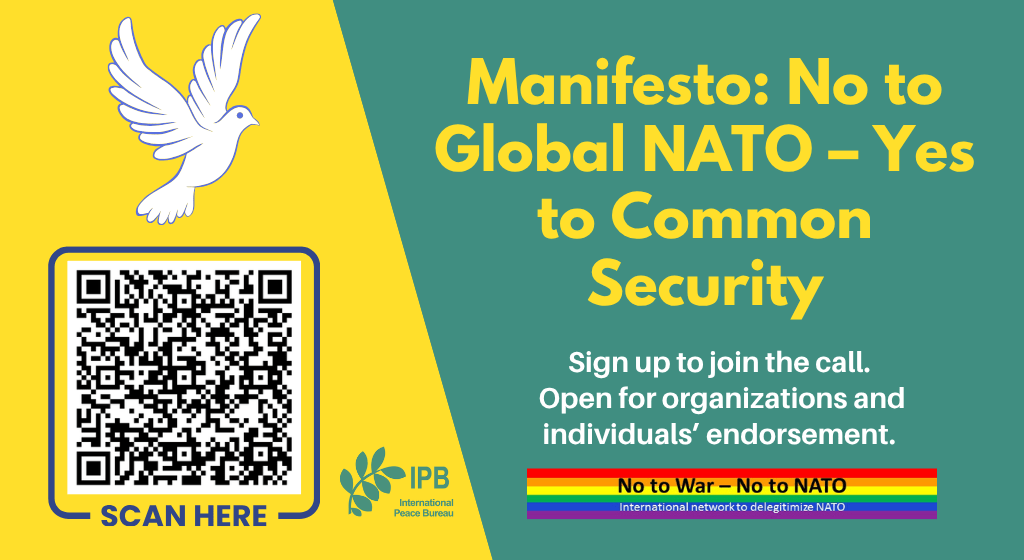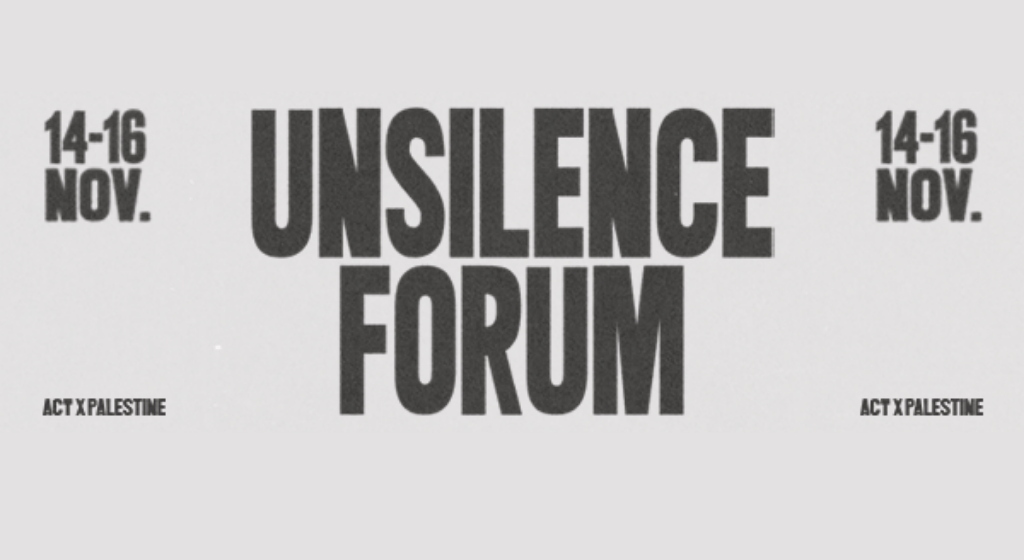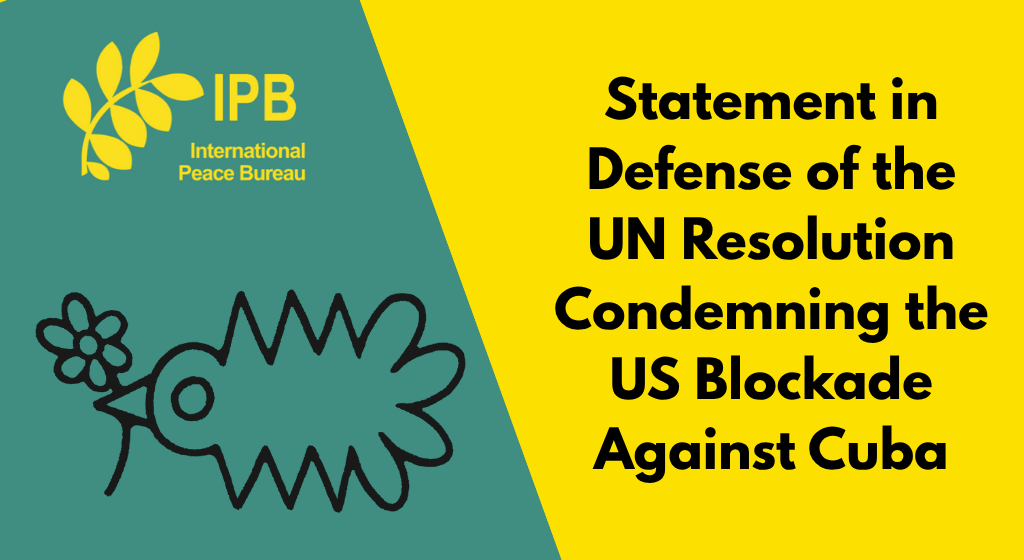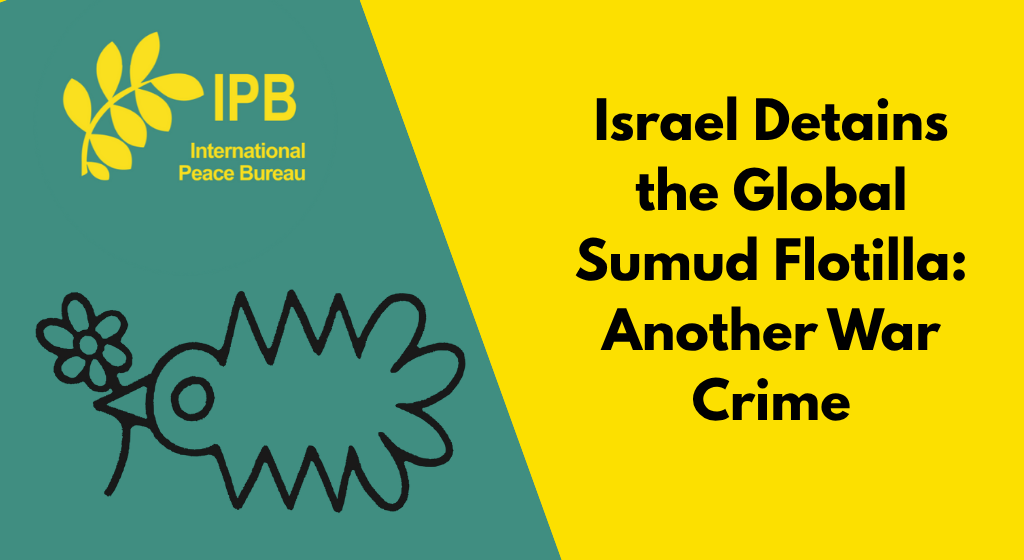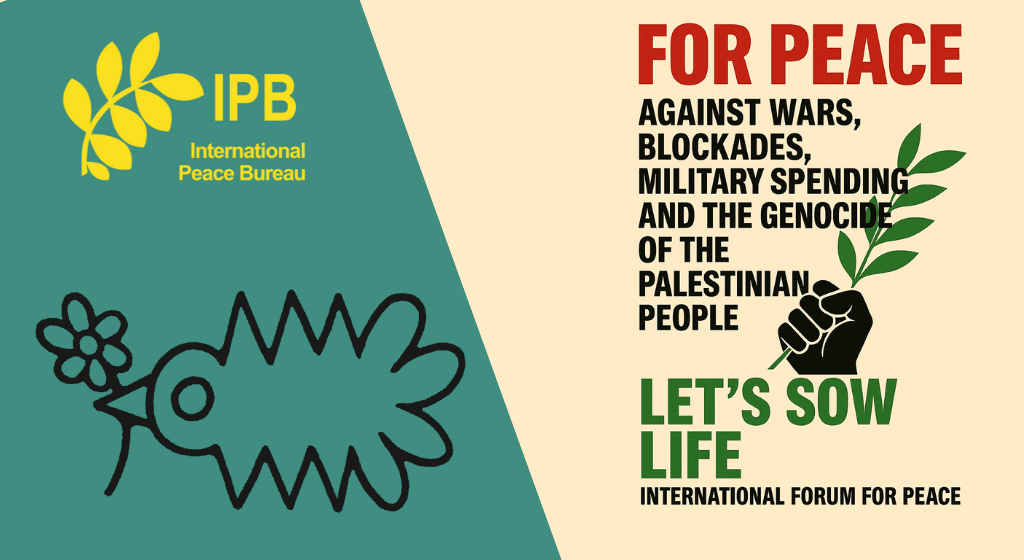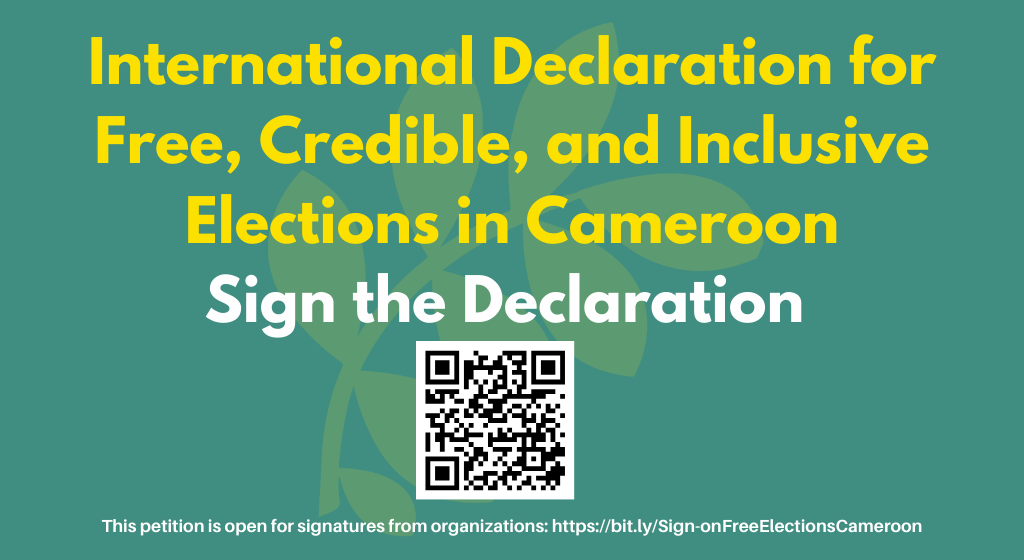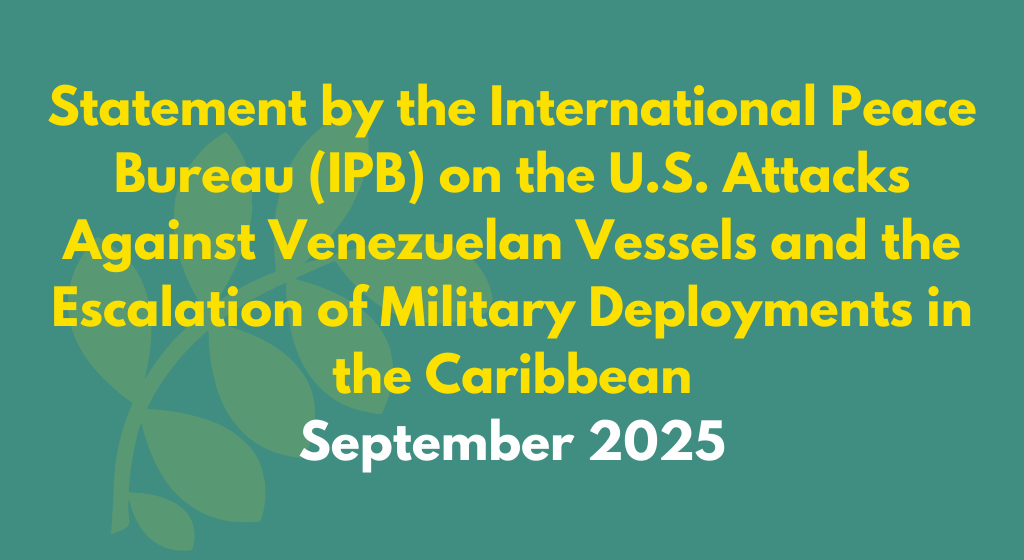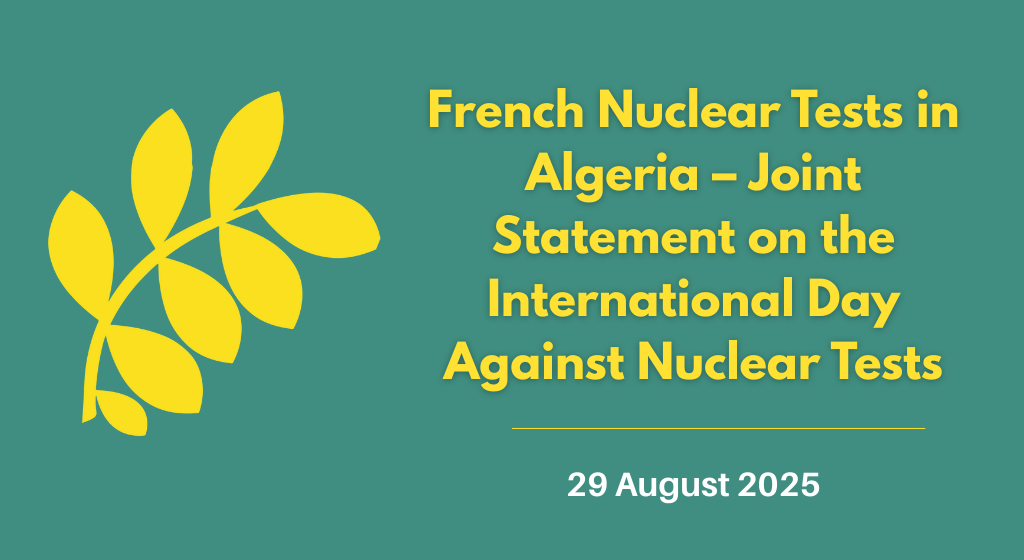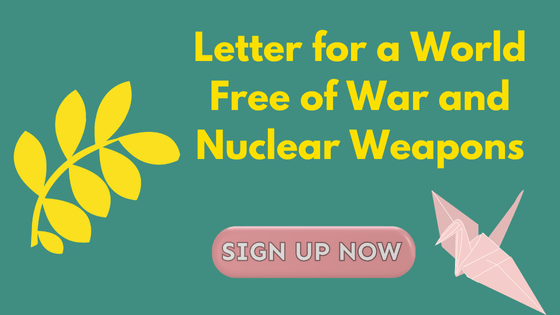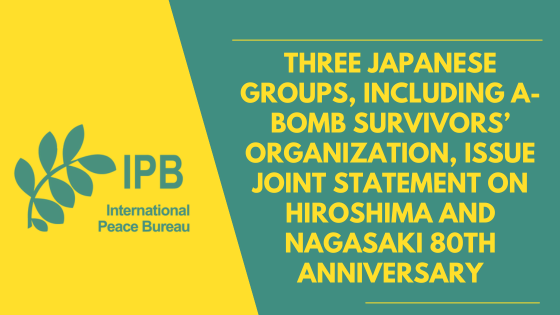NATO is an increasing obstacle to achieving world peace. It is no longer an organization confined to the North Atlantic: it is the world’s largest military alliance, with allies and partners in Asia, Africa and Latin America. Since the end of the Cold War, NATO has reinvented itself as a tool for military action, psychological warfare, worldwide military and political interventions, and accessing resources and markets; it often claims to undertake these actions on behalf of the “international community”. With its partnerships and joint operations, it is a vehicle for the US strategic goal of global dominance; reinforced by military bases on all continents, it bypasses the United Nations and the system of international law, accelerating militarization, escalating arms expenditures and fueling arms races.
Continue reading “Manifesto: No to Global NATO – Yes to Common Security”IPB Statements
UNSILENCE FORUM
[Press Release: Act X Palestine]
With figures such as Youmna El Sayed and Wael Al Dahdouh, who were Al Jazeera’s voices in Gaza, paying an enormous personal price; lawyer Raji Sourani, who is leading the effort to bring the Israeli government before the International Criminal Court; and Iranian activist Sanam Naraghi-Anderlini.
The UNSILENCE FORUM brings to Barcelona a historic debate on the future of democracy and peace in the Euro-Mediterranean region
From 14 to 16 November, journalists, human rights defenders and activists from more than 20 countries will gather in Barcelona to think, create and resist in the face of genocides, occupations and rearmament, with first-hand testimonies from Gaza and across the region, in a unique gathering framed within the global call ACTxPALESTINE.
Continue reading “UNSILENCE FORUM”Statement in Defense of the UN Resolution Condemning the US Blockade Against Cuba
DECLARACIÓN EN DEFENSA DE LA RESOLUCIÓN DE NNUU QUE CONDENA EL BLOQUEO A CUBA POR LOS EEUU
El Foro Internacional por la Paz, espacio de cooperación y coordinación en el que participamos organizaciones políticas, sociales que defendemos la Paz y la Solidaridad entre los Pueblos expresamos el mas firme respaldo a la resolución presentada ante la Asamblea General de las Naciones Unidas que llama a poner fin al bloqueo económico, comercial y financiero impuesto por el Gobierno de los Estados Unidos contra la República de Cuba.
Continue reading “Statement in Defense of the UN Resolution Condemning the US Blockade Against Cuba”Israel Detains the Global Sumud Flotilla: Another War Crime
Statement by the International Forum for Peace
In violation of the United Nations Convention on the Law of the Sea (UNCLOS), International Humanitarian Law, and Article 54 of the Geneva Convention and its Additional Protocol I, the government of Benjamin Netanyahu has ordered the interception of the Global Sumud Flotilla and the detention of its crew in waters over which it has no jurisdiction.
Continue reading “Israel Detains the Global Sumud Flotilla: Another War Crime”Call of the International Forum for Peace Against Wars, Blockades, Military Spending, and the Genocide of the Palestinian People
LET US SOW LIFE | 21 September 2025
On this September 21, declared by the UN as the International Day of Peace, dedicated to strengthening the ideals of peace, at a time when the increase in military spending is generating a spiral of warmongering that endangers the future of humanity, we, from the International Forum for Peace, wish to express our rejection of wars, the arms race, the arsenal of weapons of mass destruction, the exponential growth of military spending, and our defense of a future of Peace and progress for humanity.
Continue reading “Call of the International Forum for Peace Against Wars, Blockades, Military Spending, and the Genocide of the Palestinian People”Sign On: International Declaration for Free, Credible and Inclusive Elections in Cameroon
We, international organizations and partners committed to democracy, human rights, the rule of law, and lasting peace, express our deep concern over the sociopolitical and security climate ahead of the presidential election scheduled for 12 October 2025 in Cameroon.
The country is experiencing a profound crisis marked among others by:
Continue reading “Sign On: International Declaration for Free, Credible and Inclusive Elections in Cameroon”Statement by the International Peace Bureau (IPB) on the U.S. Attacks Against Venezuelan Vessels and the Escalation of Military Deployments in the Caribbean
The International Peace Bureau (IPB) expresses deep concern over the recent deployment of U.S. Navy destroyers off the coast of Venezuela and, most urgently, the destruction of two Venezuelan vessels that resulted in the deaths of 14 people. Such militarization of the Caribbean constitutes a direct threat to the “Zone of Peace” that Latin American and Caribbean states have collectively declared. Far from promoting stability, these actions risk inflaming tensions, undermining sovereignty, and dragging the region into dangerous cycles of militarization and violence.
Continue reading “Statement by the International Peace Bureau (IPB) on the U.S. Attacks Against Venezuelan Vessels and the Escalation of Military Deployments in the Caribbean”French Nuclear Tests in Algeria – Joint Statement on the International Day Against Nuclear Tests
We, the undersigned organizations, on the occasion of the International Day Against Nuclear Tests, 29 August 2025, express our deep concern at the passing of more than six decades since the start of the series of nuclear tests conducted by France in the Algerian Sahara between 1960 and 1966. These included 17 nuclear explosions in addition to 40 subcritical supplementary tests, leaving a heavy legacy of widespread radioactive contamination and resulting in severe health, environmental, and social damage that remains to this day.
Continue reading “French Nuclear Tests in Algeria – Joint Statement on the International Day Against Nuclear Tests”Letter for a World Free of War and Nuclear Weapons
English and Spanish
On August 6 and 9, 2025, the individuals and organizations signing this letter will commemorate the 80th anniversary of the events in which the United States dropped two nuclear bombs on the Japanese populations of Hiroshima and Nagasaki, killing 150,000 people and leaving thousands more injured and suffering serious consequences. We honor and remember all those lives lost and injured by the nuclear bombs. For them, for us, we say No to the existence and use of nuclear weapons!
Continue reading “Letter for a World Free of War and Nuclear Weapons”Three Japanese Groups, Including A-Bomb Survivors’ Organization, Issue Joint Statement on Hiroshima and Nagasaki 80th Anniversary
23 July 2025, Japan – Ahead of the 80th anniversary of the atomic bombings of Hiroshima and Nagasaki, three organizations calling for the abolition of nuclear weapons, including the Japan Confederation of A- and H-Bomb Sufferers Organizations, issued a joint statement on the 23rd, calling for “the most important thing is to raise awareness in Japan and around the world about the inhumanity of nuclear weapons, regardless of differences of position.”
Continue reading “Three Japanese Groups, Including A-Bomb Survivors’ Organization, Issue Joint Statement on Hiroshima and Nagasaki 80th Anniversary”
